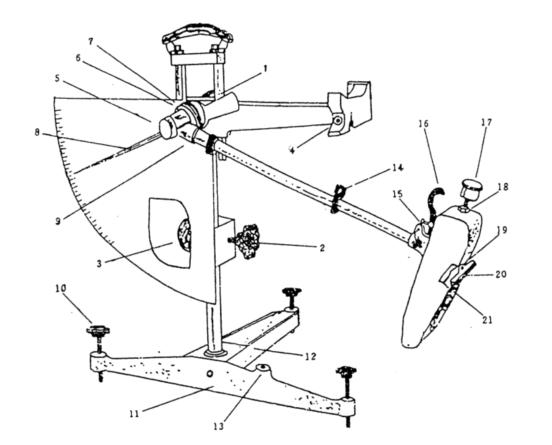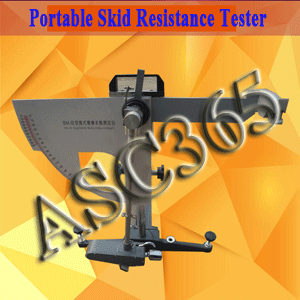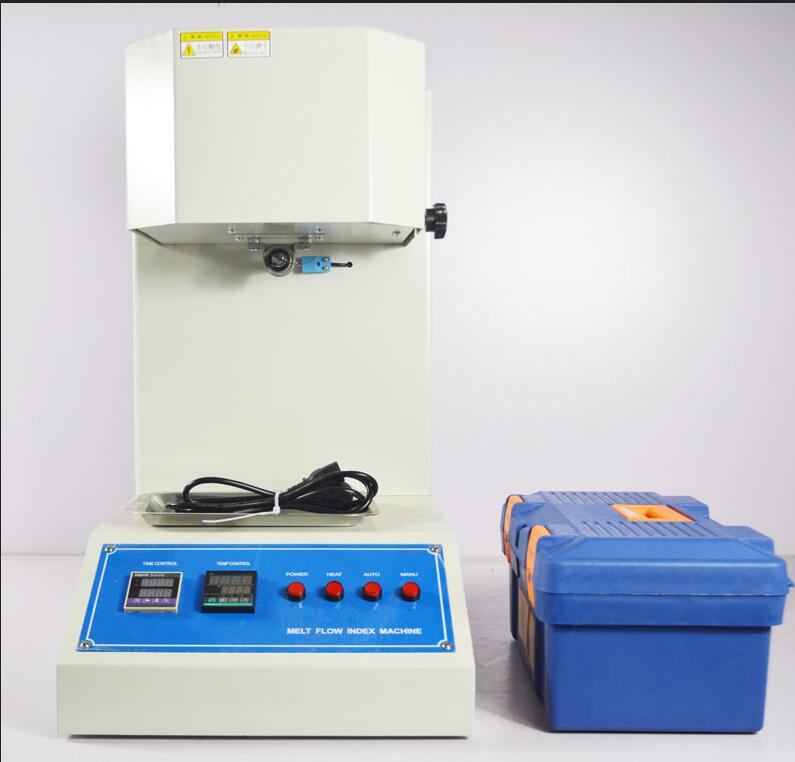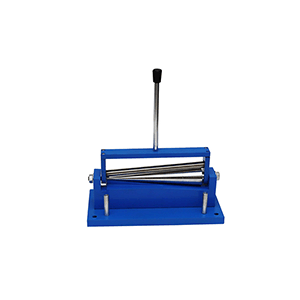|
|
新建网页 1
|
Portable Skid Resistance Tester 154003 |
|
.jpg) |
|
Product Introduction
The skid resistance tester is
used to determine friction coefficients of road surface, airport
runway, marking paint, etc., and to determine the friction
coefficients of typical road surfaces to provide a basis for various
tire compounds. The tester is characterized by convenient debugging,
simple operation, less impact on traffic during measuring, more
stable data, and usage in both indoor and outdoor circumstances. |
|
Item specifics
Usage: Abrasion Tester
Rocking torque:615000g.mm
Weight of the
pendulum: 1500g(3.3lb)
Gravity
moment of the pendulum: 410mm(16.1inch)
Scale distance: 508mm
Forward static
pressure from rubber sheet to pavement:2263g(5lb)
Distance between
rocking center to rubber sheet outer edge:508mm(20inch)
Net
weight:14kg(30.9lb) |
|
 |
|
1. Fixing handle 2
& 3 Lifting handle 4. Release switch
5. Steering stem
cap 6. Adjusting screw 7. Needle reed 8. Pointer
9. Connecting
screw 10. Level screw 11. Base support
12. Level bubble
13. Snap ring 14. Positioning screw 15. Lifting handle
16. Balance hammer
17. Fixing screw 18. Sliding block
19. Rubber sheet
20. Anti sliding screw |
|
Main Components
1. Base support:
comprised of T shape leg, leveling screw and level bubble, it’s used
for level and support purpose;
2. Column:
comprised of column, lifting mechanism, guiding rod, handle, used
for lifting and fix the head;
3. Release switch:
installed on the pendulum rod, used for keeping the rod horizontal
position and to release the pendulum;
4. Steering
system: comprised of fixing handle, pendulum shaft, steering
knuckle, bearing, it’s used to keep the pendulum can freely swing
within the plain;
5. Indicating
system: comprised of pointer felt coil, pressing cap, pointer
adjusting screw and scale plate, pointer can directly indicate the
value;
6. Pendulum head:
comprised of upper lower connector, pendulum rod, spring, lever,
lifting handle, hammer shell, slider, rubber
piece(76mm*25.4mm*6.35mm), it has specific torque to the swing
center, also specific pressure to the pavement.
|
|
.jpg) |
|
Operation
Instruction
Select points
On the test pavement, along with the left wheel
running direction, choose 5 representative points, each point apart
by 5-10m.
Leveling
Place the tester on the test point, let the swing
direction same with the car running direction;
Rotate the leveling screw to let the level bubble in
middle position.
Zero setting
1)Pointer position
calibration: let the pendulum in perpendicular status, dial the
pointer to let the upper part closely contact the adjusting screw,
now the pointer pointing position should align to the pendulum rod
center position, otherwise should adjust the adjusting screw to let
the pointer align with the pendulum rod center position, after
adjusting should fix the screw thus to fix the pointer adjusting
screw position;
2)Release fixing
handle, rotate the lifting handle to lift the pendulum and let it be
in freely swing status, then screw the fixing handle;
3)Let the pendulum
move to right, let the positioning snap ring enter into the on-off
slot, let the swing rod locate in horizontal release position,
meanwhile, dial the pointer by left hand to let it closely contact
the screw on the needle dialer;
4)Press the
release switch then pendulum will swing to left, and drive the
pointer to move upward, when pendulum move to the highest position
then drop, catch the pendulum rod by left hand, now the pointer
should be in zero point, if not, can fasten or release the pointer
adjusting screw till the pointer is in zero point.
Sliding distance calibration
1)Use rubber brush
to clean the test area of pavement;
2)Let pendulum
freely hang, let the ruler center align to the pendulum rod, let the
sliding ruler parallel to the test direction and close to the rubber
sheet;
3)Release the
fixing handle, rotate the lifting handle to let the pendulum fall
slowly and meanwhile let the pendulum to move to right, place slider
on ruler right side and let it contact pavement surface and align to
the ruler scale, then let the pendulum move to left, and place slide
on left side and let it contact pavement surface and align to the
ruler scale, then screw the fixing handle and recheck the sliding
length, during this process can perform fine adjustment of the
sliding length by leveling screw, let the sliding length keep within
126±0.5mm, note that the level bubble should in middle position
during regulation.
Test procedure
Spray some water
on pavement, then use rubber brush to brush the road of the mud,
then spray water again, and press the release switch to let the
pendulum slide on the surface, pointer will then indicate the
pendulum value(generally first time not record); when pendulum swing
back to right, catch the pendulum rod by left hand, lift the slider
by right hand, and let the pendulum move to right, let the
positioning snap ring enter into release switch, repeat the
operation and test 5 times(every time should spray water) and record
each time value, the difference in 5times shall not over 3 units, if
not, should check and find out the reason.
Test result
1) Each point
takes the average value of 5 tests as the friction coefficient;
2)The friction
coefficient is calculated by the pendulum value to divided 100, if
the pendulum value is 33, then the coefficient is 33/100=0.33.
|
|
Noted matters
1.Due to the
friction coefficient is influenced by whether and temperature, so
should record the test date and pavement temperature when testing;
2.Should record
the pavement structure type, appearance, period of operation;
3.When pendulum
move to left and return, shall catch the rod to avoid to damage the
slider and pointer;
4.Within the
sliding range shall not have obvious convex and concave shape;
5.When calibrate
the Sliding length, should subject to when the rubber is just
contact the surface, should not slide forward by the pendulum force,
otherwise the calibrated sliding length will have error;
6.To indicate the
most harmful condition of the road, should choose the part with
lower coefficient and frequent brake, that’s just the left wheel
along the running direction.
7.When use new
rubber sheet, should firstly test on dry road for 10times then test
on wet road for 20times, then can be used. Rubber sheet abrasion
long side not surpass 3.2mm, short side not over 1.6mm, otherwise
should replace with new one. And if the rubber sheet was polluted
should not use again. The rubber sheet effective lift is 12months,
shouldn’t use again regardless it was used or not. Because the
rubber will aging, the elastic and hardness will change thus will
effect the test result.
Maintenance &
Storage & Transportation
1.It’s kind of
precision instrument, users should protect it from any damage
otherwise may effect the test accuracy, before operation should read
the user manual carefully and get familiar with the instrument
structure and operation method. It’s not allowed to uninstall the
instrument at will except the flexible or the removeable part.
2.After operation,
clean the instrument and stored into the case, place it in the room
with good ventilation, no acid, no corrosion.
3.During long
distance transportation, the instrument should be kept in case, no
sudden impact or over shake during transportation.
4.Should be
calibrated at least once every year under normal condition
|
|
Item Include |
|
Portable Skid
Resistance Tester154003 |
.jpg) |
|






